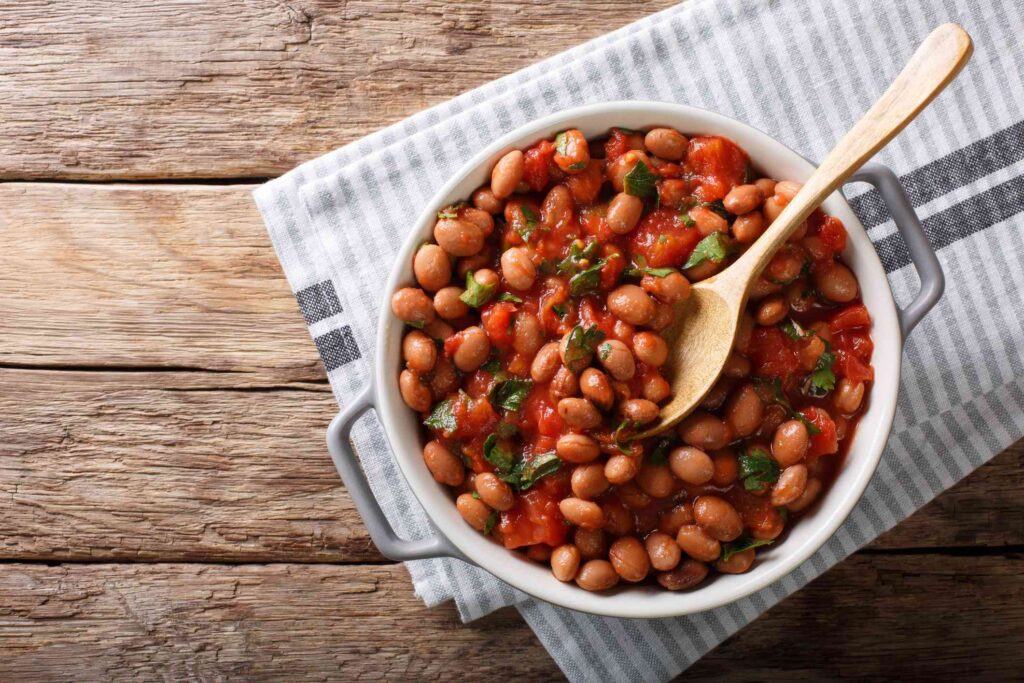Beans are an excellent source of plant-based protein, usually containing around 15 grams per cup when cooked.
The Recommended Dietary Allowance for adults is 0.8 grams of protein per kilogram of body weight, but current research suggests that most people need much more. Obtaining enough protein can be challenging, especially for people who don’t consume animal protein sources. That’s where beans can help.
Krit of Studio OMG / Getty Images
1 cup: 15 grams of protein
Black beans are rich in fiber and packed with antioxidants that help fight inflammation. They’re also an excellent source of iron, providing more than 50% of your Daily Value (DV) in each cup.
Alessio Bogani / Stocksy
1 cup: 15 grams of protein
Kidney beans are an excellent source of folate, supporting red blood cell production and fetal development during pregnancy.
Verywell / Alexandra Shytsman
1 cup: 15 grams of protein
In addition to packing in the protein, navy beans are also linked to improvements in gut health and weight management support.
bhofack2 / Getty Images
1 cup: 11 grams of protein
One cup of drained and rinsed chickpeas, also known as garbanzo beans, contains approximately 11 grams of protein.
Victority / Getty Images
1 cup: 18 grams of protein
Lentils can also support blood sugar control, weight management, and gut health.
years / Getty Images
1 cup: 31 grams of protein
Soybeans—the fully mature version of edamame—are protein-dense, making them a popular base for many meat substitute products. They’re also rich in antioxidants that help fight inflammation and promote brain health.
The fiber in beans can help promote satiety (feelings of fullness), gut health, and blood sugar control. When included in a well-balanced diet, their high fiber content may also help lower cholesterol and reduce the risk of heart disease.
Research shows beans have a lower glycemic response than other starchy foods, meaning they cause less of a spike in blood sugar after eating. Beans are also a complex carbohydrate, providing steady, long-lasting energy to prevent blood sugar spikes and dips.
Beans are packed with vitamins and minerals, including iron, potassium, magnesium, and B vitamins like folate. Folate helps promote red blood cell formation and brain health, while iron is essential for blood flow and oxygen transport throughout the body. Magnesium and potassium are key to muscle function and healthy blood pressure levels.
Incorporating beans into a well-balanced diet can be relatively simple. Dried beans need to be cooked to become tender before eating, while frozen and canned beans only need to be warmed.
When preparing dried beans, consider soaking them in water for several hours or overnight to reduce cooking time and improve their digestibility. Canned beans may be high in sodium, so many healthcare providers recommend draining and rinsing them to remove excess sodium.
You can cook beans in a pot on the stove or in a pressure or slow cooker. Add low-sodium seasonings like herbs, spices, and olive oil to enhance the beans’ natural flavors. Adding acidic ingredients like vinegar or tomatoes may also alter the texture and taste.
Try these meal ideas, rich in bean-based protein:
- Chili: Combine different beans, such as kidney beans, black beans, and chickpeas, to increase the nutritional value of your standard chili recipe.
- Bean tacos: Instead of meat, use refried or whole beans as the protein source in tacos. Black beans and pinto beans pair well with traditional taco seasonings and toppings.
- Salads: Top your favorite lettuce with black beans, avocado, tomatoes, and corn to make a nutrient-dense salad. Chickpeas also pair well in most salads as a protein-rich topping.
- Lentil soup: Cook lentils with vegetables in a plant-based broth to increase your protein intake on a vegetarian or vegan diet.


